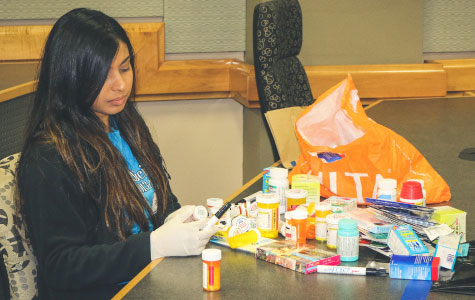TPPC Wraps Up Spring Medication Cleanout Cycle
 The Texas Panhandle Poison Center (TPPC) completed its spring Medication Cleanout cycle April 28 at the TTUHSC Lubbock campus. During the four-hour collection period,
event volunteers saw 408 vehicles and took in 1,097.5 pounds of unwanted, expired
or unused medications and 71.5 pounds of sharps.
The Texas Panhandle Poison Center (TPPC) completed its spring Medication Cleanout cycle April 28 at the TTUHSC Lubbock campus. During the four-hour collection period,
event volunteers saw 408 vehicles and took in 1,097.5 pounds of unwanted, expired
or unused medications and 71.5 pounds of sharps.
TPPC’s spring Medication Cleanout cycle also included collections at the TTUHSC campuses in Amarillo (March 24) and Abilene (April 28). Volunteers at the Amarillo collection saw 637 vehicles bring in 2,024.5 pounds of unwanted, expired or unused medications and 278 pounds of sharps. The Abilene event drew 223 vehicles, 548 pounds of medications and 151.5 pounds of sharps.
TPPC Managing Director Jeanie Jaramillo-Stametz, Pharm.D., said Medication Cleanout provides the Poison Center with an opportunity to conduct research regarding unused medications.
“As the nation works to gain control of the opioid epidemic, we are learning the downstream effects of tighter regulations on substances such as hydrocodone,” Jaramillo-Stametz explained. “The events also give students of various health professions the opportunity to volunteer and see firsthand the enormity of the issue with the accumulation of both prescription and over-the-counter medications in the home while they also serve their communities.”
Since starting the program in 2009, TPPC has conducted 56 Medication Cleanout events and collected 43,047 pounds of medications and 2,679 pounds of sharps for incineration. Jaramillo-Stametz said TPPC initially thought the Medication Cleanout program would be a temporary event, but they’ve since learned they are providing a service that is needed on an on-going basis.
“It is encouraging that residents are working to ensure that their homes and neighborhoods are safer by removing unused medications from their homes; and our TTUHSC community is happy to serve the people of our region with this program,” Jaramillo-Stametz said. “We’ve also found that there is a significant need for disposal services for sharps, needles and syringes across the Panhandle.”
She said TTUHSC is uniquely positioned to assist the public with this because the university maintains medical waste disposal services.
To reduce the quantity of unused or unwanted medicines, Jaramillo-Stametz said consumers should be mindful that they are only purchasing or receiving those medications that will be used.
“This is particularly a problem with mail-order services in which medication refills may be sent when the patient either no longer needs the medication or still has a sufficient supply,” she said. “With over-the-counter medications like vitamins, supplements and herbal products, consumers shouldn’t purchase large quantities unless you are sure you will use them. Purchase a small bottle and determine whether the product will work for you before you invest in large quantities.”
Jaramillo-Stametz said consumers should also remain vigilant in storing their medications properly, tracking their use and ensuring that items that are no longer in use are disposed of as soon as possible.
“Medicine cabinets remain the number one source of prescription medications that are sought after for abuse or misuse purposes, and over-the-counter medications may be abused as well,” she stressed. “People can add a clean-out-the-medicine-cabinet note to their calendars on daylight savings time adjustment days to ensure their medicine cabinet is cleaned out at least twice a year.”
Image Gallery
Related Stories
How Does Your Garden Grow?
As spring approaches, some people’s thoughts turn to gardening. Whether it’s a flower garden they desire or a vegetable garden want to have, they begin planning what they’ll plant and what they need to do to ensure a successful garden.
Adopt a Growth Mindset for a Better Life
A “growth mindset” accepts that our intelligence and talents can develop over time, and a person with that mindset understands that intelligence and talents can improve through effort and learning.
Drug Use, Family History Can Lead to Heart Disease in Younger Adults
Abstaining from drug abuse and an early diagnosis of familial hypercholesterolemia (high cholesterol) can help prevent heart disease.
Recent Stories
TTUHSC, TTU School of Veterinary Medicine Recognize Student Research During Inaugural Amarillo Research Symposium
More than 100 student and trainee researchers from the TTUHSC and the TTU School of Veterinary Medicine presented research findings at the 2024 Student Research Day on April 19.
The TTUHSC Laura W. Bush Institute for Women’s Health Welcomes Ben Carson as Power of the Purse Keynote Speaker
Retired neurosurgeon and former U.S. Secretary of Housing and Urban Development Ben Carson, M.D., delivered a keynote address at the Power of the Purse luncheon and fundraiser today (April 18).
Filling the Gap: PA Impact on Rural Health Care
Assistant Professor and Director of Clinical Education Elesea Villegas, MPAS, PA-C, spoke about the challenges rural health care currently faces and how PAs are stepping up to better serve the rural patient population.
